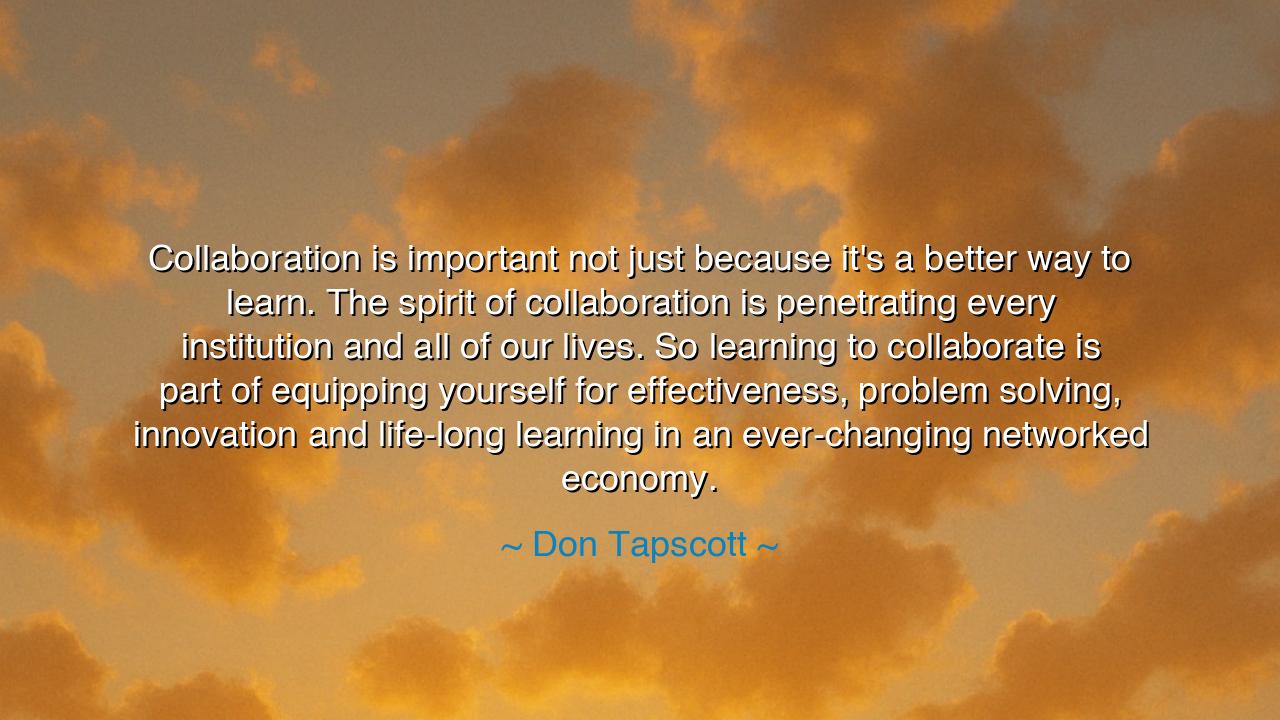
Collaboration is important not just because it's a better way to
Collaboration is important not just because it's a better way to learn. The spirit of collaboration is penetrating every institution and all of our lives. So learning to collaborate is part of equipping yourself for effectiveness, problem solving, innovation and life-long learning in an ever-changing networked economy.






When Don Tapscott declared, “Collaboration is important not just because it's a better way to learn. The spirit of collaboration is penetrating every institution and all of our lives. So learning to collaborate is part of equipping yourself for effectiveness, problem solving, innovation, and life-long learning in an ever-changing networked economy,” he spoke as a prophet of the digital age — an era in which no man or woman can thrive alone. His words carry the weight of a truth as ancient as civilization itself, yet renewed for our time: that to collaborate is to live wisely among others, and that greatness, in our interconnected world, is born not from isolation, but from unity.
In the ancient style, one might say Tapscott spoke as a modern philosopher of the polis — the city of minds. Just as the Greek agora once served as the meeting place of philosophers, merchants, and citizens, today’s world has become a vast and living network, where ideas move like wind and knowledge flows like water. Tapscott’s insight reveals that learning itself has evolved — that in the age of shared technology and instant communication, collaboration is no longer optional; it is essential. It is not merely a method of study but a condition of survival in the great web of modern life.
To understand his meaning, we must look back to the origins of progress. Every great advance in human history has been born not from solitude, but from collective effort. The cathedrals of Europe were not built by one architect, but by generations of builders whose combined vision reached heavenward. The discoveries of science — from Newton’s laws to Einstein’s relativity — stand upon the shoulders of countless thinkers who came before. Even the digital age itself, which Tapscott so deeply explores, was not the work of a single genius, but the shared creation of engineers, coders, and dreamers across nations. Thus, collaboration is not a novelty of the internet era; it is the ancient engine of civilization, now amplified by modern connection.
Yet Tapscott’s wisdom also carries a warning: in a networked economy, where knowledge is shared and innovation constant, those who cannot collaborate will fall behind. The lone craftsman, the solitary thinker, the jealous guardian of secrets — these belong to an older world. The new world demands openness, adaptability, and communication. To “equip yourself for effectiveness,” as he says, is to master not only one’s own craft but also the art of working in harmony with others — listening, sharing, and building together. The mind that resists collaboration becomes a closed room; the mind that embraces it becomes a palace of light.
History offers powerful examples of this truth. Consider the story of The Manhattan Project, where scientists from many nations and disciplines joined forces to harness atomic energy. Though born in a time of war, their collaboration revealed what human minds could achieve when united under a single purpose. Likewise, in our own age, the creation of the World Wide Web by Tim Berners-Lee was not an act of isolation but of generosity — a gift to connect humanity. Both moments teach us that collaboration, though born of necessity, can transform into a force that shapes the destiny of the world.
But beyond utility, Tapscott’s quote reminds us of something deeper — the spirit of collaboration, the moral and emotional virtue of working together. It is not simply about efficiency or innovation, but about empathy — understanding that the strength of one is bound to the strength of all. In learning to collaborate, we learn to listen, to respect, and to trust. We learn humility, for every person holds a piece of the truth we do not yet see. In the ancient way, this is not merely a skill — it is a discipline of the soul, a cultivation of harmony between human beings.
So, the lesson is clear: to thrive in the modern world, cultivate collaboration as both craft and character. Seek out the wisdom of others, not to compete, but to complete what you alone cannot finish. When you learn, learn with others; when you teach, teach alongside others; when you work, work as one body of many hearts. The age of isolation is over, and the age of connection has dawned. To resist collaboration is to resist the future itself.
Therefore, remember this truth, children of the new age: collaboration is not weakness, but power shared; not dependence, but interdependence; not surrender, but unity in purpose. Whether in study, invention, or life itself, let your learning be a shared fire — one that grows brighter with every hand that tends it. For in the great network of humankind, those who build together shall stand together, and those who learn together shall endure, ever growing, ever shining, in the boundless light of collective wisdom.






AAdministratorAdministrator
Welcome, honored guests. Please leave a comment, we will respond soon